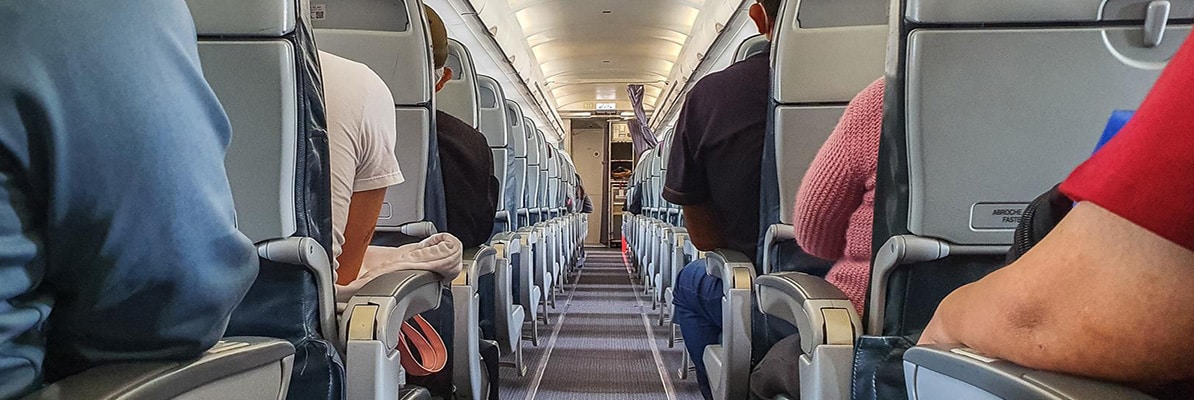
Colorado Workers’ Compensation for Airline Employees
Everything airline workers need to know to file a claim after an injury in Colorado
Denver boasts a robust aviation industry whose recent growth has greatly exceeded the national average. In fact, as of 2020, there were more than 21,000 employees working for 970 aviation-related companies in Denver.
While communities, businesses and employees alike benefit from the continued growth of the airline industry in Denver, these jobs also pose certain occupational hazards to workers.
If you count on aviation for your livelihood, it’s important to understand how Colorado’s workers’ compensation program can help you if you suffer an on-the-job injury or illness.
Common airline employee jobs
It takes a wide variety of skills and resources to keep an airline running smoothly. Some employees, such as pilots and flight attendants, have high visibility on an airplane. Others work behind the scenes but perform equally important roles.
A few of the most common airline jobs include:
- Aviation mechanics
- Reservation agents
- Baggage handlers
- Air traffic controllers
- Aircraft dispatchers
- Security guards
- Food service workers
Common airline injuries
The U.S. Bureau of Labor Statistics (BLS) reports that nearly 5,000 non-fatal workplace injuries or illnesses took place in 2019 among flight attendants. Furthermore, the odds of being injured at work are much higher for cabin stewards than for those working in other industries. Overall, there were 517 incidents per 10,000 employees, as opposed to 86.9 across all sectors.
Some common ways airline workers are hurt on the job include:
- Repetitive motion injuries
- Burns
- Electrical injuries
- Overexertion injuries from lifting heavy baggage or helping passengers who need physical assistance
- Breathing and skin problems from exposure to harmful substances
- Head and traumatic brain injuries from falling baggage or equipment
- Hearing issues and loss from exposure to high levels of noise
- Broken bones and spinal cord injuries from vehicle accidents or slip-and-fall accidents due to working in congested aisles or on moving walkways
Risk of violence to airline workers
Unfortunately, it seems as though flight crew members are increasingly becoming the victims of violence. According to the Association of Flight Attendants, 85% of flight attendants dealt with unruly passengers in 2021, and nearly 20% of those incidents involved physical assaults.
Cabin crew members are encouraged to try to diffuse these types of situations by first speaking quietly with the passenger about the issue. Sometimes, simply reseating that person can be enough to eliminate the problem.
If the behavior continues, airline stewards may refuse to serve alcohol or ask the captain to have law enforcement standing by when the plane lands. In extreme circumstances, flight attendants may even need to restrain passengers for the safety of themselves and other travelers.
Colorado workers’ compensation highlights
Colorado’s workers’ compensation program allows most injured employees to claim benefits without having to file a lawsuit. As such, it protects individuals as well as the companies they work for.
Workers’ compensation is no-fault insurance, meaning people are eligible for compensation even if they were partially negligent in causing their injury. Workers only need to prove that their injuries or illnesses occurred within the scope and course of their jobs.
Anyone who is hired to perform services for pay is generally considered an employee in Colorado and is, therefore, eligible for worker’s compensation benefits. Even so, there are a few exceptions, such as:
- Independent contractors
- Volunteers who work in a ski area
- Licensed real estate agents and brokers working on commission
- Certain business owners
- Drivers operating under a lease agreement with a contract or common carrier
It’s worth noting that if your employer is the FAA or another federal agency, you would need to pursue workers’ comp benefits under the federal program. You would not be eligible for benefits under the Colorado state workers’ comp insurance program.
How Federal Employees Obtain Workers’ Compensation
Denver attorney R. Mack Babcock explains how workers’ compensation for federal employees differs from other work-related injury claims.
What workers’ comp benefits are available to injured airline workers?
Colorado law provides for the following workers’ compensation benefits after a work-related injury or illness:
- Medical benefits. These benefits include coverage of all necessary medical care, including doctor visits, hospitalizations, medications, rehabilitation, surgeries and the cost of travel to and from appointments.
- Wage loss benefits. These benefits provide injured workers with compensation to cover two-thirds of their average weekly wage if they can’t work or can only work in a limited capacity while recovering from an injury or illness.
- Death benefits. These benefits, which include compensation for funeral expenses and lost income, are available to certain dependents if a worker dies from a work-related injury or illness.
The amount of compensation you can receive depends on the extent of your injury, your expected recovery time and your long-term prognosis.
Unfortunately, airlines often put up a fight when it comes to paying workers’ compensation because each claim has the potential to increase their already expensive insurance premiums.
An experienced workers’ compensation attorney can advise you of your rights and ensure that all necessary procedures are followed to minimize the chances of your claim being denied.
Steps for filing a Colorado workers’ comp claim
Although airline workers may travel through many states and countries during the course of their work, they should typically file a claim for workers’ comp benefits in the state in which they were hired after an injury in the skies.
Injured workers should take the following steps to file a workers’ comp claim in Colorado:
- Seek medical attention. Immediately following an injury, seek emergency medical care. This will ensure your injury is documented and provide proof that it was caused by a work accident.
- Notify your employer. Next, provide written notification of the accident to your employer within 10 days.
- Verify your employer filed a claim. Upon receiving your notice, your employer must then file an Employer’s First Report of Injury with their insurance company within 10 days. This will effectively open a claim with the insurance company on your behalf.
- Contact an attorney. If you don’t receive compensation or you feel you are getting the runaround, contact an experienced workers’ compensation attorney for assistance.
It can take some time for you to hear back from the insurance company, but ideally, no more than 20 days. In the meantime, follow all recommendations for treatment and keep copies of all medical reports and financial records.
Safety tips for airline workers
Taking measures to keep yourself safe is always better than suffering a workplace injury. Some ways those in the aviation industry can avoid injuries include the following:
- Keeping surfaces dry and well-maintained in order to prevent slips, trips and falls
- Working as a team to resolve potential conflicts quickly
- Undergoing regular safety training
- Inspecting all equipment before use
- Wearing proper safety gear, especially when handling hot items
- Maintaining good health practices to avoid getting sick
Contact an experienced Colorado workers’ compensation attorney
Navigating the workers’ compensation claims process can often be just as stressful as being hurt on the job, and even small mistakes can significantly impact your ability to collect fair compensation. Working with an attorney will ensure all necessary paperwork is filed in a timely manner and minimize the chance that your claim will be unjustly denied.
If you’re an airline worker who’s been injured on the job, contact the experienced work injury attorneys at The Babcock Law Firm. Our attorneys are committed to helping injured Coloradans get maximum compensation after a work accident. Let us handle the negotiations with your employer and their insurance company so you can focus on healing.
Contact us today for a free consultation of your case.


